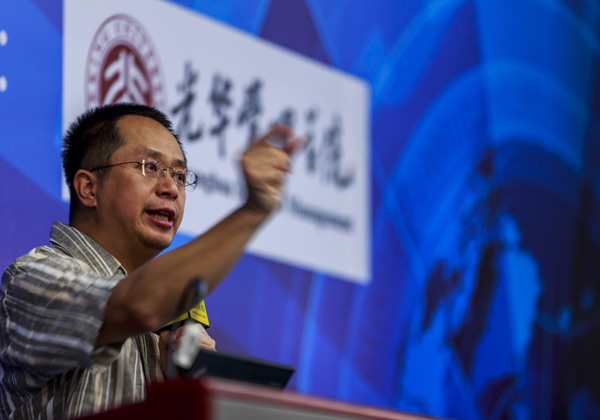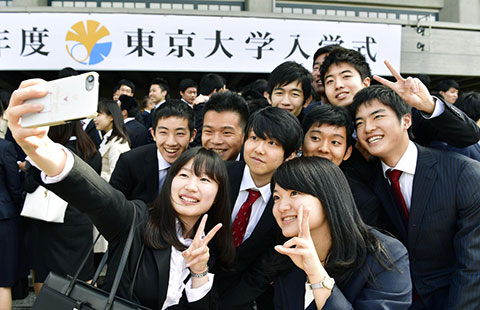New war of words as Zhou enters market
|
 Zhou Hongyi, chairman and chief executive officer of Qihoo 360 Technology Co Ltd, delivering a speech at Tsinghua University. [Photo / Provided to China Daily] |
Chief threatens to machinegun rival's rotund penguin mascot
Zhou Hongyi never misses a chance to mock his competitors in public.
The chairman and chief executive officer of Qihoo 360 Technology Co Ltd told the media recently he would enjoy shooting Tencent Holdings Ltd's iconic dumpy penguin mascot with a machinegun, which is the latest provocative message from the nation's biggest Internet giant as measured by user population.
Less than a week before that, on innumerable occasions, Zhou challenged China's top Web search engine Baidu Inc in the searching and browser markets.
Zhou's quick tongue and aggressive remarks have made him public enemy No 1 in the Internet industry in which most Chinese entrepreneurs prefer avoiding direct conflict with competitors.
"An even temper brings wealth," they say, quoting an ancient saying.
Yet Zhou's aggressive approach has also made his company a fortune. Qihoo's first quarter revenues hit $109.9 million, a roughly 60 percent increase year-on-year, according to a company report.
The company said total monthly active users of Qihoo's products and services reached a record 457 million by the end of the first quarter, compared with 411 million a year ago.
Qihoo's advance in business is gradually gaining recognition from the US' Wall Street financial hub, where the company is listed.
The company's stocks surged to a 52-week high in mid-June. United States business website cnnmoney.com recommended buying stock in Qihoo after polling 13 investment analysts.
However, Baidu and Tencent are preparing to counterstrike Qihoo's businesses in China in the hope of maintaining the leading position in their own sectors.
On June 20, Baidu joined hands with Russian online security company Kaspersky Lab to launch an anti-virus software targeting Qihoo's dominance in the area. Anti-virus software has formed Qihoo's major business since the establishment of the company in 2005.
The move came after Qihoo's ambitious act in promoting a self-branded Internet search engine and Web browser challenging Baidu.
Baidu processed nearly 67 percent of search requests by the end of the first quarter while the Qihoo-powered Internet search engine took 13.4 percent of the requests, data from Beijing research company Analysys International showed.
"Qihoo quickly grabbed market share, taking advantage of its browsers and other software," said the report.
The nation's other Internet giant Tencent, based in Shenzhen, Guangdong, plans to attack Qihoo on the security front.
WeChat, a popular social networking application owned by Tencent, may add mobile security services, according to a National Business Daily report. Analysts say the new service may slow Qihoo's advance among smartphone users, the major population in the emerging mobile Internet sector.
Tencent is a long-time rival of Qihoo. In 2010, Qihoo and Tencent were heavily involved in a massive war of words after both companies blamed the other for blocking functions of their software products.
The dispute reflects the companies' cutthroat competition in online traffic.
Although the Beijing-based company has lost most of its lawsuits against Tencent, it was able to consolidate its presence in the mobile sector.
Last year, Tencent's Pony Ma decided to invest 1 billion yuan ($163 million) in the online security sector to challenge Qihoo. However the investment was insufficient to stop Qihoo. The company is now entering other sectors.
On June 18, Qihoo released its first hardware product: a portable WiFi router. Industry insiders believe the gadget will help Zhou and his company gain more of a say in the industry. "Qihoo may use the router to enforce tighter controls over various devices such as smartphones, smart TVs and personal computers," according to Hong Bo, a renowned IT critic in China.

























